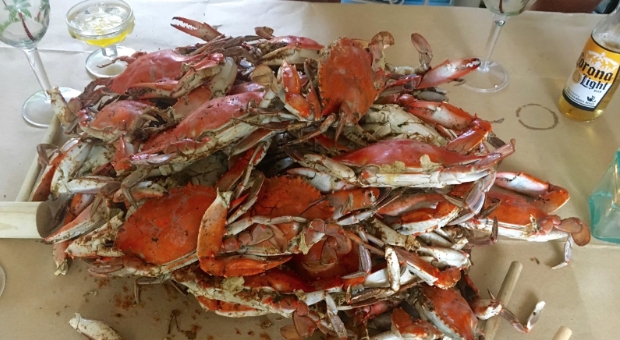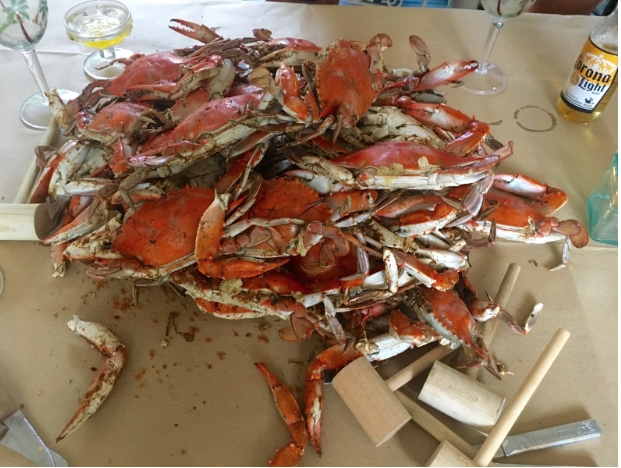I have what is usually referred to as a “good ear” for languages. My French is very good, unaccented (if I do say so myself), and my Arabic (thanks to the Peace Corps) isn’t too bad. I have a smattering of Italian, a little less Spanish, and I can fall into a reasonable imitation of an Irish or Scottish brogue almost at the drop of a hat. But try as I might, I can’t speak Crab.
My wife and her very large family are almost all from Maryland and they speak Crab fluently. I sit at a table that’s covered in brown paper and festooned with a heaping mound of steamed crustaceans, weapons of attacks (mallets, claw crackers, and crab knives) and all the other necessary implements of war (butter, Old Bay, vinegar, and of course cold beer), smiling politely as if I understand what is going around me. But the truth is I don’t have a clue; it’s all gibberish to me.
I do understand a few words: claw, leg, shell, but that’s about the extent of my crab talk. Occasionally, I hear a word a word I think I understand—knuckle, mustard, coral, plate, apron, corner—but they’re used in sentences that make no sense. For a while, I thought all crabs were named Jimmy or Jumbo, but then someone said “I got a Sook” but she sure looked like Jimmy or Jumbo to me. Someone else said he liked the tomalley, but I couldn’t see anything on the table that looked like a tomato or an olive. Another person claimed to be cleaning out the corners, but the table was beginning to look awfully messy to me. In fact, what was once just a table was now a war zone, littered with bits of shells, butter stains, and soggy heaps of Old Bay seasoning. As the discard pile grew, the room—thankfully an outdoor screened porch with ceiling fans—began to smell like last week’s trash. No one else seemed to mind or even notice.
I will say this: there was an awful lot of conversation over all those dead crabs. Well, no; maybe not actual conversation…more like chatter, but that’s par for the course among this group. The din was more like a happy background buzz interrupted by swigs of beer or sips of wine or the whack of a hammer on a claw. I just nodded and kept on smiling.
Eventually, I came to understand that we weren’t eating crabs; we were picking crabs. Some people immediately ate what they extracted from yet another abandoned shell; others built a small mountain of meat which I surmised would be consumed at some indefinite point in the future. It seemed to me like an awful lot of squeeze for very little juice, but once again I was a minority of one. And yet, somehow, all those little lumps of meat were gaining traction in stomachs, but then again maybe it was just the butter and beer. All I knew was that my hands and shirt were a mess; my lips were on fire. That was before the steamed corn arrived along with more butter and a tomato/mozzarella salad with balsamic vinegar and fresh basil from the garden, both languages I can thankfully speak. Things were looking up: even though I’m dieting, I began to wonder what was for dessert, another language I speak all too well.
Eventually, corn became cobs and what was once a bushel of tasty crabs became several hefty bags of garbage. We went from eating—I mean “picking”—to cleaning up in a flash. Someone removed the stained brown paper and crab residue from the table, someone else swept he floor, dishes were washed, and empty beer bottles went to the recycling container. All of a sudden, the storm was over. I would like to say that an eerie quiet descended on the room, but that would be fake news.
I still don’t speak or understand Crab. I guess it’s not in my DNA; I’ll always be a Maryland outlander, a “Sassenach” as my Scots ancestors would say in their old Erse. But maybe, just maybe, with a little more practice, I’ll learn a few more words in the language of crabs.
I’ll be right back.
Jamie Kirkpatrick is a writer and photographer with homes in Chestertown and Bethesda. His work has appeared in the Washington Post, the Baltimore Sun, the Pittsburgh Post-Gazette, the Philadelphia Inquirer, the Washington College Alumni Magazine, and American Cowboy magazine. “A Place to Stand,” a book of photographs and essays about Landon School, was published by the Chester River Press in 2015. A collection of his essays titled “Musing Right Along” was published in May 2017; a second volume of Musings entitled “I’ll Be Right Back” will be released in June 2018. Jamie’s website is www.musingjamie.com.




[…] The Language of Crabs by Jamie Kirkpatrick […]